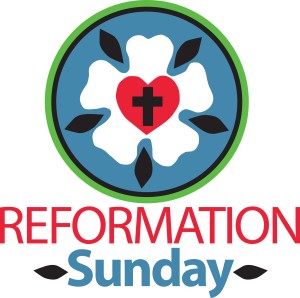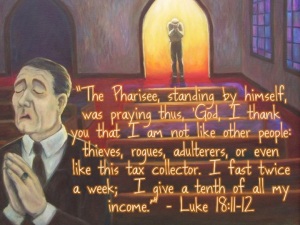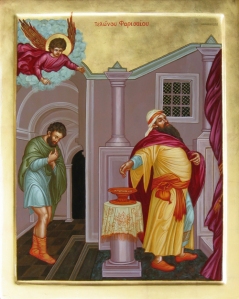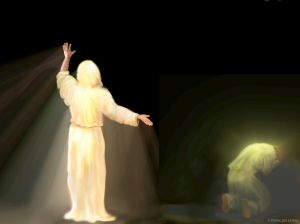“What’s Stopping You?”
James 5:13-20 and Mark 9:38-50
September 30, 2012, First Presbyterian Church of Jesup
 There’s this great home video my family has of my sister and I dancing together when we were little. She’s around three and a half years old or so and I’m just about two. This picture is from a few years later, but gives you a bit of an idea about how my sister and I enjoyed dancing. In the video we were probably dancing to the Bangles’ “Walk Like an Egyptian,” a favorite of ours at the time. I’m sort of moving every which way and she is running around in circles. She stops me and says, “you’re not doing it right… like this!” And I happily follow her, running around in the same direction that she’s been running in.
There’s this great home video my family has of my sister and I dancing together when we were little. She’s around three and a half years old or so and I’m just about two. This picture is from a few years later, but gives you a bit of an idea about how my sister and I enjoyed dancing. In the video we were probably dancing to the Bangles’ “Walk Like an Egyptian,” a favorite of ours at the time. I’m sort of moving every which way and she is running around in circles. She stops me and says, “you’re not doing it right… like this!” And I happily follow her, running around in the same direction that she’s been running in.
This is the image that comes to mind for me when I read our passage in Mark. The disciples had a great idea of how to follow Christ. My sister had a great idea of how we should be dancing. And then here comes someone else that’s just not doing it right.
 The disciples have been walking with Jesus since the beginning of His ministry. If anyone knows the right way to do things, it would be them, right?
The disciples have been walking with Jesus since the beginning of His ministry. If anyone knows the right way to do things, it would be them, right?
When the new believers of this time began following Christ they were most often responding to an experience they had with Him. A healing they had witnessed, a transformation they had encountered, a sermon that spoke truth to their very soul. Many of the gospel stories end with people believing and going off to share with others. Many of these conversions do not come with a lot of instructions on how to be a Christian, because that word didn’t exist yet. These people simply knew that this man named Jesus had come for the sake of each person. He preached an upside down, backwards is forwards revolutionary message of loving others that society would deem unlovable. And that was enough for many. They decided to follow Jesus, often giving up their own way of life, their families, and their possessions.
 The disciples have been with Jesus from the start. They’re the veterans. Anyone who’s ever had a younger sibling or become an upperclassman has a bit of an idea of how these disciples felt. Sure they wanted to bring in new believers, expand the Kingdom of God, but did that have to be at the expense of losing the closeness of the original community surrounding Jesus? These people didn’t really get it in the same way. These people weren’t doing it right!
The disciples have been with Jesus from the start. They’re the veterans. Anyone who’s ever had a younger sibling or become an upperclassman has a bit of an idea of how these disciples felt. Sure they wanted to bring in new believers, expand the Kingdom of God, but did that have to be at the expense of losing the closeness of the original community surrounding Jesus? These people didn’t really get it in the same way. These people weren’t doing it right!
Our Mark passage today talks about stumbling blocks in faith. The word often translated as “put a stumbling block” in front of people or “cause to stumble,” is from the Greek verb skandalizein. This word and its English cognate, “scandalize,” carry a meaning closer to “causing one to be so horrified that they are no longer able to continue in the same direction they’ve been traveling.” This is much more severe than a simple stumble. This is a fall flat on your face and never come back sort of fall.
 I know people who have had this sort of experience with church. When they needed a community of believers most in their lives they were called sinful, deemed unworthy, or even just ignored. To them, church is just a place where people will tell them that whatever they are doing, they’re doing it wrong. Being told you are dancing the wrong way when you are two is something that you can get past. Being told that you are an unworthy sinner by the very people you seek out for love can create wounds for a lifetime.
I know people who have had this sort of experience with church. When they needed a community of believers most in their lives they were called sinful, deemed unworthy, or even just ignored. To them, church is just a place where people will tell them that whatever they are doing, they’re doing it wrong. Being told you are dancing the wrong way when you are two is something that you can get past. Being told that you are an unworthy sinner by the very people you seek out for love can create wounds for a lifetime.
It is a genuine concern to desire for the church to speak not an easy truth, but an authentic witness. It is important for the church to acknowledge the history of those who have gone before. But when our desire for the way things have always been gets in the way of someone experiencing the love of Christ, we are that stumbling block, we are the scandalizing ones.
 Sometimes we get so frustrated in the way that others present Christianity that we’d like to tell them, “you’re not doing it right,” and direct them in the way that they should go. I do believe that God calls us to cry out against injustice and anyone speaking a word of hate claiming it is in the name of God.
Sometimes we get so frustrated in the way that others present Christianity that we’d like to tell them, “you’re not doing it right,” and direct them in the way that they should go. I do believe that God calls us to cry out against injustice and anyone speaking a word of hate claiming it is in the name of God.
 But, aside from acts of injustice or hatred, those who simply worship Jesus in a different way, are still our brothers and sisters in Christ and we should stand beside them. The image of the church in our community and our world needs to be one of love, not of division. As Christ says in our passage “anyone who is not against us is with us.”
But, aside from acts of injustice or hatred, those who simply worship Jesus in a different way, are still our brothers and sisters in Christ and we should stand beside them. The image of the church in our community and our world needs to be one of love, not of division. As Christ says in our passage “anyone who is not against us is with us.”
This is a prophetic word for a world of political, social, and religious polarizing. We are told that there’s “them” and there’s “us.” And if you’re not an “us,” then you’re a “them.”
The disciples, too, felt this desire for categories. These new followers were the “them,” the disciples were the “us.” How could the disciples sit idly by while they professed to be driving out demons in the name of Christ?
Listen carefully to the words again: “Teacher, we saw someone casting out demons in your name, and we tried to stop him, because he was not following us.” They weren’t stopping this man who was doing work in the name of Jesus because he wasn’t doing good work or because he wasn’t doing the work of God, they came because he was not following “us.” He was not one of the in-crowd of disciples. There also may have been a bit of jealousy involved in the disciples’ disapproval of this man.
 Earlier in Mark chapter nine we read of another incident, where scribes were arguing with the disciples. Here’s how Mark tells the story: [Jesus] asked them, “What are you arguing about with them?” Someone from the crowd answered him, “Teacher, I brought you my son; he has a spirit that makes him unable to speak; and whenever it seizes him, it dashes him down; and he foams and grinds his teeth and becomes rigid; and I asked your disciples to cast it out, but they could not do so.” [Mk. 9:16-18]
Earlier in Mark chapter nine we read of another incident, where scribes were arguing with the disciples. Here’s how Mark tells the story: [Jesus] asked them, “What are you arguing about with them?” Someone from the crowd answered him, “Teacher, I brought you my son; he has a spirit that makes him unable to speak; and whenever it seizes him, it dashes him down; and he foams and grinds his teeth and becomes rigid; and I asked your disciples to cast it out, but they could not do so.” [Mk. 9:16-18]
A few verses later, when the crowd is gone and the disciples are alone with Jesus, they ask him about their failure and Jesus gives them an answer. When he had entered the house, his disciples asked him privately, “Why could we not cast it out?” He said to them, “This kind can come out only through prayer.” [Mk. 9:28-29]
 So when they are angry with this nameless disciple for casting out demons in the name of Christ they’re not just angry because it might’ve been “unauthorized.” They’re angry because this had been done by a man who wasn’t even a part of the original disciples. Their complaint is based solely on their desire to have exclusive rights to bringing the good news of Jesus Christ to the world. And even more frustrating, the disciples were not even successful in stopping this man! “We tried to stop him,” they say to Jesus. The work of God went on in spite of the disciple’s interference.
So when they are angry with this nameless disciple for casting out demons in the name of Christ they’re not just angry because it might’ve been “unauthorized.” They’re angry because this had been done by a man who wasn’t even a part of the original disciples. Their complaint is based solely on their desire to have exclusive rights to bringing the good news of Jesus Christ to the world. And even more frustrating, the disciples were not even successful in stopping this man! “We tried to stop him,” they say to Jesus. The work of God went on in spite of the disciple’s interference.
“Jesus said, ‘Do not stop [them]; for no one who does a deed of power in my name will be able soon afterward to speak evil of me. Whoever is not against us is for us. For truly I tell you, whoever gives you a cup of water to drink because you bear the name of Christ will by no means lose the reward.’”
Jesus wants to work through this nameless follower, as misguided as the disciples thinks he may be. This is important to keep in mind on several levels. If we seek to do the will of Christ in this world, Christ will work through our efforts. If we invoke the name of Christ in blessing, Christ will indeed bless. When I endeavor to speak Christ’s truth from this pulpit, Christ will be the One to impart truth.
Jesus continues on in his lesson to the disciples, almost in the same way I can imagine a parent talking to a child when a new sibling is introduced to the family or the way upperclassmen may need to be lectured against bullying new students. This is a “don’t mess with the little guy,” type of talk.
Jesus says, “If any of you [scandalize] one of these little ones who believe in me, it would be better for you if a great millstone were hung around your neck and you were thrown into the sea. If your hand causes you to stumble, cut it off; it is better for you to enter life maimed than to have two hands and to go to hell, to the unquenchable fire. And if your foot causes you to stumble, cut it off; it is better for you to enter life lame than to have two feet and to be thrown into hell. And if your eye causes you to stumble, tear it out; it is better for you to enter the kingdom of God with one eye than to have two eyes and to be thrown into hell, where their worm never dies, and the fire is never quenched.”
Wow. That seems quite threatening coming from the “Prince of Peace.” Surely as Christ desires peace, Christ desires the strength of the Kingdom even more so. Though the text of this passage seems like a call for physical violence and self harm, we can think of this more in the context of the church as the body of Christ. Separating from those causing harm to the church is like separating out a body part, painful, but necessary if it will allow you to survive. And so, even these very essential, very involved disciples may need to be separated out of the body of Christ if they are causing harm to other believers.
When I first began working on this sermon, I gave it the title, “what’s stopping you?” but these verses also point to perhaps a better question, “who are you stopping?” We are called to be the body of Christ in this world. God’s own hands and feet in this community. We are called to speak the love of Christ louder than we speak of division and politics. We are called to affirm Christ’s claim on each and every life. We are called to empower others to do Christ’s work in this world.
 Our passage in James today gives us instructions on how we are to care for one another it says, “Are any among you suffering? They should pray. Are any cheerful? They should sing songs of praise. Are any among you sick? They should call for the elders of the church and have them pray over them, anointing them with oil in the name of the Lord.”
Our passage in James today gives us instructions on how we are to care for one another it says, “Are any among you suffering? They should pray. Are any cheerful? They should sing songs of praise. Are any among you sick? They should call for the elders of the church and have them pray over them, anointing them with oil in the name of the Lord.”
In all occasions we are called to pray for one another, for as James tells us, “The prayer of the righteous is powerful and effective.”
So who are those that you are called to pray for today? Who are the “suffering?” Who are the “sick?” What is stopping you from praying for them? I would say the first step in knowing who to pray for, is acknowledging those around you. Like in the book we read in the children’s message today, the important time do to things is now, the most important ones are the ones around us, and the more important thing to do is good for those around us. God has called you into this life you are living and desires to work in and through you. This is a work that can only be done when we live lives steeped in prayer. The Kingdom can only be built when we open our doors and our lives to those who we might not recognize as the in-crowd. For Christ came not only for “us,” but for “them” as well. Amen.
 oday is Reformation Sunday, a day that marks the beginning of the Protestant Church as we know it today. It’s a day for celebrating how far we’ve come as a church. Our affirmation of the priesthood of all believers: which means all of us are called to read and interpret scripture, minister to the community, and have a personal relationship with Jesus Christ. The ways that over the generations we continue to be reformed and always being reformed according to the word of God, a principle that has motivated believers throughout the year to stand up for justice for the enslaved, equality of all of God’s created people, and expand the pulpit to women and minorities. So, let’s just pat ourselves on the back! We’re so righteous, so much better than everybody else!
oday is Reformation Sunday, a day that marks the beginning of the Protestant Church as we know it today. It’s a day for celebrating how far we’ve come as a church. Our affirmation of the priesthood of all believers: which means all of us are called to read and interpret scripture, minister to the community, and have a personal relationship with Jesus Christ. The ways that over the generations we continue to be reformed and always being reformed according to the word of God, a principle that has motivated believers throughout the year to stand up for justice for the enslaved, equality of all of God’s created people, and expand the pulpit to women and minorities. So, let’s just pat ourselves on the back! We’re so righteous, so much better than everybody else! Our Gospel lesson gives us a rather confrontational passage for this Reformation Sunday. One that shows someone so pleased by their righteousness, a Pharisee. Verses 11-12 tells us, “The Pharisee, standing by himself, was praying thus, ‘God, I thank you that I am not like other people: thieves, rogues, adulterers, or even like this tax collector. I fast twice a week; I give a tenth of all my income.’”
Our Gospel lesson gives us a rather confrontational passage for this Reformation Sunday. One that shows someone so pleased by their righteousness, a Pharisee. Verses 11-12 tells us, “The Pharisee, standing by himself, was praying thus, ‘God, I thank you that I am not like other people: thieves, rogues, adulterers, or even like this tax collector. I fast twice a week; I give a tenth of all my income.’” It’s an uncomfortable comparison to put side by side with a Pharisee. In Luke 7:29-30 we are told, that upon hearing of Jesus’ miracles, “All the people who heard this, including the tax collectors, acknowledged the justice of God, because they had been baptized with John’s baptism. But by refusing to be baptized by him, the Pharisees and the lawyers rejected God’s purpose for themselves.”
It’s an uncomfortable comparison to put side by side with a Pharisee. In Luke 7:29-30 we are told, that upon hearing of Jesus’ miracles, “All the people who heard this, including the tax collectors, acknowledged the justice of God, because they had been baptized with John’s baptism. But by refusing to be baptized by him, the Pharisees and the lawyers rejected God’s purpose for themselves.” This tax collector doesn’t try to defend himself when being bad-mouthed by the Pharisee. He wasn’t working on a list of his good deeds or his exceptionalism, rather he defers to God’s great power. In verse 13 we read, “But the tax collector, standing far off, would not even look up to heaven, but was beating his breast and saying, ‘God, be merciful to me, a sinner!’”
This tax collector doesn’t try to defend himself when being bad-mouthed by the Pharisee. He wasn’t working on a list of his good deeds or his exceptionalism, rather he defers to God’s great power. In verse 13 we read, “But the tax collector, standing far off, would not even look up to heaven, but was beating his breast and saying, ‘God, be merciful to me, a sinner!’” In verse 14 Jesus tells the assembled crowd, “I tell you, [the tax collector] went down to his home justified rather than the [Pharisee]; for all who exalt themselves will be humbled, but all who humble themselves will be exalted.”
In verse 14 Jesus tells the assembled crowd, “I tell you, [the tax collector] went down to his home justified rather than the [Pharisee]; for all who exalt themselves will be humbled, but all who humble themselves will be exalted.”








